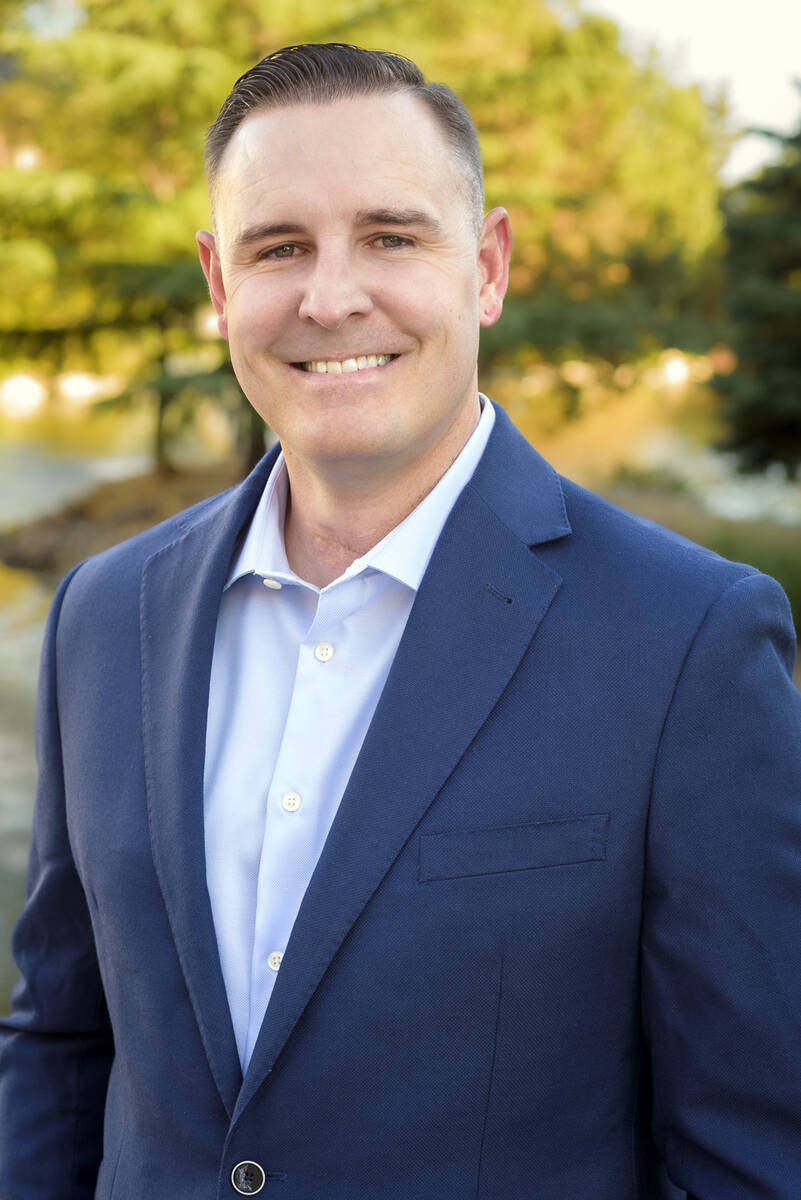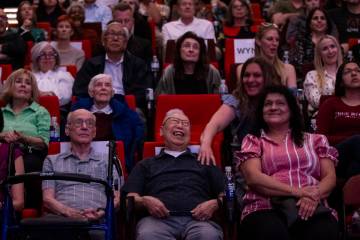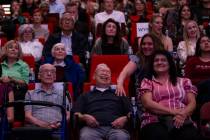Las Vegas agencies strive to help those in addiction recovery
About a month before he was arrested and set on a path of recovery, Paul Vautrinot could not see a light at the end of tunnel.
“I remember thinking to myself I’m going to die down here,” he said. “There’s no way out. There’s no hope, there’s no chance for a better life.”
The Las Vegas native started using heroin when he was 18, leading him to years living in the flood drains of the city. He was arrested on a warrant and placed in drug court.
He has now been clean and sober for eight years.
Vautrinot works at Crossroads of Southern Nevada and Shine A Light Foundation, two of a handful of organizations that help people struggling with addiction. Both organizations serve people in Clark County, but in different ways.
Crossroads is the largest detox in Las Vegas. Vautrinot is the vice president of operations. It takes people no matter what their insurance status is and helps them through 90 days of treatment.
“It doesn’t matter. If you come to our door and you need help, we’re going to help you,” Vautrinot said.
Vautrinot is the executive director of Shine A Light, a homeless outreach and case management organization. Staff go out and visit the homeless, primarily in the flood drains and tunnels. Shine A Light covers 90 days of treatment and 90 days of housing, and also provides case management for up to two years.
“We’re basically a master class on everything that’s available in the community based on what it is that you A, need, or B, want,” Vautrinot said.
In 2022, Shine A Light has helped more than 270 people escape homelessness, and its active case list includes about 110. He said the organization has a 70 percent success rate.
Having gone from receiving resources to helping provide them in the community, Vautrinot said he believes more can be done to guide people through the process of getting help.
“What I’ve learned being in this industry is we take them, we get them well, we treat them for 90 days and then we go ‘OK, ‘Best of luck,’” he said. “They don’t know what they can attach themselves to after that. They don’t understand.”
Vautrinot said the way the public perceives people struggling with addiction and the unhoused could go a long way in improving the problem.
“Talk to them. Acknowledge them. Look them in the eye at least. We do this thing where we like kind of tilt our head off to the side and we try to act like we didn’t see them and we just keep walking,” Vautrinot said. “It makes it that much harder to connect to individuals when we are out there trying to help because they just feel like the community is ignoring them.”
For more information, call 725-222-4654 or visit shinealightlv.com. To reach Crossroads, call 702-382-7746.
Health Plan of Nevada
Health Plan of Nevada also is doing its part by facilitating access to Medicaid services for people with or without insurance throughout Nevada. Rachel Rosensteel is associate director of health equity for the Health Plan. Health equity means helping everyone have equal access to health care and equal opportunity to achieve positive health outcomes, she said.
Rosensteel said outside factors can get in the way of someone reaching those positive outcomes.
“We know that people aren’t going to go to the doctor or even to treatment for substance abuse, they’re not going to go to therapy or want to engage in services if they have unstable housing, or if they don’t know where they’re going to sleep at night, if they don’t have food to eat,” Rosensteel said.
Health Plan has a presence in the community in places such as shelters and hospitals where members can access their services. Those who are not insured can sign up for health care through the state and select Health Plan of Nevada as the provider they’d like to work with.
Rosensteel said Health Plan does an assessment with a new member to determine that person’s health goals. Depending on the person, Health Plan will connect them with community partners such as nonprofit Vegas Stronger.
She said it’s important that providers and the community try to help everyone they come across regardless of how that person may look on the outside.
“If they are judged or treated a certain way it really turns them off from accessing services ever again,” Rosensteel said. “That one bad experience can just ruin everything to that person and then it makes it really hard for the individual and then also for us as their care team to reverse that.”
For more information, visit healthplanofnevada.com or call 1-800-777-1840.
Adelson Clinic
Located on Maryland Parkway, the Adelson Clinic is a private nonprofit founded by Dr. Miriam Adelson and the late Sheldon Adelson. The clinic was founded in 2000 and treats addiction to opioids and heroin by providing medications including methadone and buprenorphine.
“Medication assisted treatment prevents opioid withdrawal symptoms, reduces the craving for opiates, stabilizes the patient, reduces the abuse of other drugs like cocaine and benzodiazepines, reduces infections with Hepatitis B & C virus and HIV, improves medical status and restores the patient to a productive, independent and responsible life,” administrative assistant supervisor Michelle Schucker said in an email.
The clinic accepts all Nevada Medicaid plans as well as Medicare and some private insurance. The clinic offers a reduced weekly fee for patients without insurance.
To qualify for the program, walk-ins are welcome Monday or Wednesday, no later than 7:30 a.m., to speak with a counselor for a drug assessment. Potential patients must have a valid ID.
For more information, call 702-735-7900 or email info@adelsoncliniclv.com.
‘It could be anybody’
Austin Pollard had a good life. He was in the Marines, had a home, a boat, a dog and good relationship with his family.
After his discharge, he turned to pain medication to cope with mental illness and pain. The dependency eventually developed into addiction to heroin and methamphetamine. He said he started out as a functioning addict but the addiction ended up consuming every aspect of his life.
Pollard ended up living on the street, out of his car before it was repossessed.
He called his dad for help and checked into a Veterans Affairs hospital. Pollard said the chemical balance of his brain was still way off and he “freaked out,” causing VA police to be called. He ended up being charged with disorderly conduct, which led to him being placed in a treatment facility in Fallon. His first two weeks were rough, and Pollard said he was close to being kicked out of the facility.
“There’s very few things that I wasn’t ever able to accomplish and here I was in a treatment center. I have a roof over my head, a nice comfortable bed. They serve us three meals a day. Pretty much all I have to do is just be there,” Pollard said. “I just have to be present and I could not figure out why that was so hard for me.”
After he hit the 30-day mark it started to click. Pollard spent 83 days at the facility, and while he had setbacks, he continued improving, and now, as part of his job, he goes out on the streets to help those who are where he was.
“It could be anybody. I have met people out on the streets doing outreach that come from all walks of life,” he said.
Pollard now works as the Nevada State Housing Program manager for United Healthcare.
“If you see somebody struggling, whether they’re in addiction or going through some serious mental illness or they’re experiencing homelessness, don’t give up on that individual either,” he said. “They still have something to offer and as people we can do a better job of lifting each other up and supporting each other.”
The Review-Journal is owned by the family of Dr. Miriam Adelson and the late Sheldon G. Adelson, founders of the Adelson Clinic for Drug Abuse Treatment & Research.
Contact David Wilson at dwilson@reviewjournal.com. Follow @davidwilson_RJ on Twitter.





























